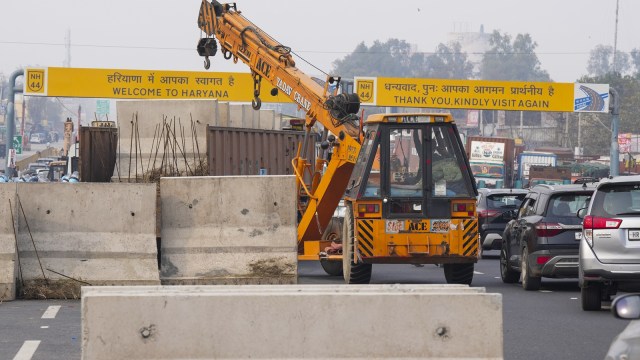Stay updated with the latest - Click here to follow us on Instagram
‘Dilli Chalo’ march top developments: Section 144 in Delhi, plea in Punjab and Haryana HC against internet suspension; and more
The Delhi Police has implemented measures under Section 144 citing the anticipated widespread tension and potential 'social unrest' ahead of the upcoming farmers' 'Dilli Chalo March' scheduled for Tuesday.
 Road blocks being placed at Singhu Border ahead of the scheduled march by the protesting farmers, in New Delhi on Monday. (PTI Photo)
Road blocks being placed at Singhu Border ahead of the scheduled march by the protesting farmers, in New Delhi on Monday. (PTI Photo)A complete ban on gatherings, processions, and rallies, as well as the entry of tractor trolleys has been enforced in the national capital for a month till March 12. The Delhi Police has implemented these measures under CrPC Section 144, citing the anticipated widespread tension and potential “social unrest” linked to the upcoming farmers’ ‘Dilli Chalo’ March scheduled for Tuesday.
Meanwhile, on Monday evening, a group of Union ministers initiated discussions with farmer leaders in an attempt to dissuade them from their march.
The directive, issued by Delhi Police Commissioner Sanjay Arora, forbids all forms of rallies, processions, and the obstruction of roads and passages with effect from February 12. Farmers from Punjab, Uttar Pradesh and Haryana are expected to enter Delhi during their march in support of various demands, including a legal guarantee of minimum support price (MSP) for all the crops.
A plea, meanwhile, has been filed in the Punjab and Haryana High Court against the suspension of internet services in several districts of Haryana and the sealing of borders in view of the protest.
The protest call has been given by the Samyukta Kisan Morcha (non-political) and the Kisan Mazdoor Morcha (KMM) seeking MSP on all crops, punishment to culprits in the Lakhimpur Kheri incident, quashing of all FIRs lodged during the farmers’ stir and Rs 10,000 per month pension for farmers aged over 60, among other demands.
Here’s a round-up of the top developments so far:
Heavy security, multi-layered barricading at Delhi borders
Extensive deployment of police and paramilitary forces, along with the implementation of multi-layered barricades, has been initiated to seal the national capital borders at Singhu, Tikri, and Ghazipur. This strategic measure aims to prevent protesting farmers from entering the city during their planned march. Drones are being utilised by the police to maintain strict surveillance at border points.
Union ministers begin talks with farmer leaders
The farmers’ leaders held a second round of talks in Chandigarh on Monday evening with the Union ministers to press for their demands, including the enactment of a law guaranteeing a minimum support price (MSP) for crops. They will proceed to Delhi based on the outcomes of the talks.
Samyukta Kisan Morcha (non-political) leader Jagjit Singh Dallewal and Kisan Mazdoor Sangharsh Committee general secretary Sarwan Singh Pandher, among others, were part of the meeting, the outcome of which is awaited.
The first such meeting with Union ministers was held on February 8.
1,200 cops deployed at entry and exit points in Chandigarh; Sec 144 in parts of Punjab, Haryana
Ahead of Tuesday’s Delhi march, the Chandigarh administration has deployed 1,200 police personnel, installed barricades and blocked roads at all entry and exit points in the Union Territory.
Section 144 of the Code of Criminal Procedure was imposed in Chandigarh on Sunday for 60 days. The Haryana government also ordered the suspension of mobile internet and bulk SMS services in seven districts from February 11 to 13. Section 144 also imposed in 15 out of the 22 districts of Haryana. Haryana Police installed concrete blocks and metal sheets to seal the both sides of the highway at Shambhu barrier over river Ghaggar in Ambala. The river bed was also dug up to prevent farmers from reaching the highway through tractors, said officials.
Rajasthan seals border with Punjab
After Haryana, Rajasthan on Saturday also closed its borders with Punjab at Sadhuwali location in Sri Ganganagar district. Additionally, Section 144 has been imposed in Sri Ganganagar, which borders Punjab’s Fazilka, Muktsar, and Bathinda districts. Many farmer unions in Rajasthan had already announced their participation in the march.
UP farmers to join with over 500 tractor-trolleys
Over 500 tractor-trolleys carrying farmers and farm labourers will march from Uttar Pradesh on February 13 to participate in the march, as announced by the BKU. A few other unions that are part of KMM will also be participating.
Union minister Piyush Goyal met farm leaders in Punjab
The first round of talks between farmer union leaders and Union ministers took place in Chandigarh on February 8.
Punjab Chief Minister Bhagwant Mann, on Thursday, stated that a consensus was reached on several demands of the farmers during a meeting with Union ministers, including Food and Civil Supplies Minister Piyush Goyal, Agriculture Minister Arjun Munda, and Minister of State Nityanand Rai.
BKU leader Jagjit Singh Dallewal, however, said that their plan to move towards Delhi on February 13 remained unchanged.
Dallewal stated that their major demand for MSP guarantee on all crops did not reach any consensus. Goyal mentioned that this was a policy matter, and the decision would be taken after going to Delhi. He also questioned why Prime Minister Narendra Modi’s report as Gujarat Chief Minister, stating MSP could be given on all crops, couldn’t be implemented now.
What are the farmers demanding?
1. Enactment of a law guaranteeing MSP (Minimum Support Price) for all crops, as per the Dr. Swaminathan Commission’s report.
2. Providing a complete debt waiver to farmers and laborers.
3. Nationwide reintroduction of the Land Acquisition Act, 2013, ensuring written consent from farmers and compensation at four times the collector rate.
4. Punishment to the accused in the Lakhimpur Kheri massacre and justice to affected farmers.
5. Withdrawal from the World Trade Organisation and a ban on all free trade agreements.
6. Pension to farmers and farm labourers.
7. Compensation to families of farmers who died during the 2021 Delhi agitation and a job to one family member of each of the deceased.
8. Scrapping of Electricity Amendment Bill, 2020.
9. 200 days of employment per year and a daily wage of Rs 700 under MGNREGA, linking it with farming.
10. Imposition of strict penalties on companies producing fake seeds, pesticides, and fertilisers and improving seed quality.
11. Formation of a national commission for spices.
12. Ensuring rights of indigenous people over water, forests, and land, stopping companies from plundering tribal land.
About SKM and KMM – the farmer unions on the forefront of the march
The Samyukta Kisan Morcha (non-political) claims to be a body of over 150 farmer unions from across the country with Jagjit Singh Dallewal as its coordinator. It is an offshoot of the SKM, a flagship body of over 500 farmer unions in India that protested against the farm laws.
The Kisan Mazdoor Morcha (KMM) is a body of over 100 farmer unions from Punjab, Haryana, Himachal Pradesh, Tamil Nadu, Telangana, Uttar Pradesh, Rajasthan etc. Though it was only formed last week, most of the unions under its banner had fought against farm laws in coordination with the SKM earlier.
The SKM is not part of the ‘Dilli Chalo’ protest and has given a call for a ‘Grameen Bharat Bandh’ on February 16. It will observe the bandh in coordination with trade unions, industrial unions, bank employees unions, transport employees, government employees associations and several other associations. The demands are almost the same as those of two forums of farmer unions that have issued the ‘Dilli Chalo’ call. In addition to the Minimum Support Price (MSP) for crops and pension for farmers, the SKM is flagging issues concerning employees, including the implementation of OPS, withdrawal of amendments to labor laws, among others.
They are also demanding a minimum wage of Rs 26,000 per month for workers, repeal of four labour codes, guaranteed employment as a fundamental right, no privatisation of PSUs, no contractualisation of the workforce, and scrapping of fixed-term employment.
Farmers, mainly from Punjab, Haryana and Uttar Pradesh, held a year-long protest on Delhi’s border points — Singhu, Tikri and Ghazipur — against the three now-repealed farm laws.







